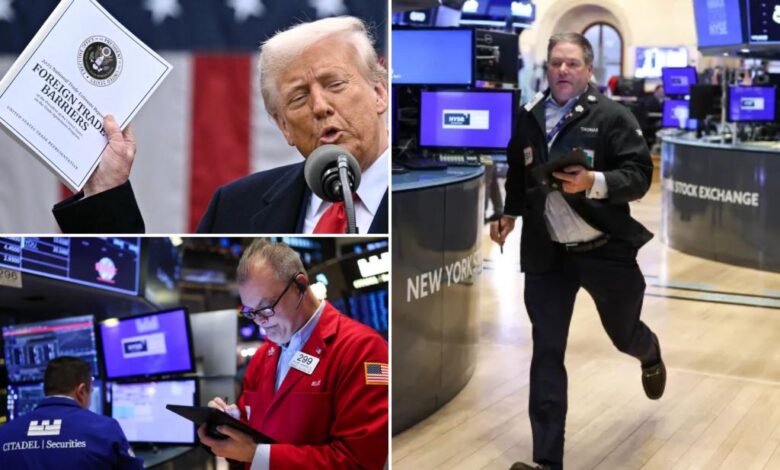Dow plunges more than 1,100 points as Trump’s reciprocal tariffs threaten trade war

President Trump’s “Liberation Day” has triggered a “day of reckoning” on Wall Street, with stocks plummeting on Thursday morning following the unveiling of reciprocal tariffs that could potentially spark a global trade war and negatively impact economies worldwide.
The Dow Jones Industrial Average dropped by 1,585 points, equivalent to a 3.8% decline, while the S&P 500 and Nasdaq also saw significant decreases of 3.4% and 4.5%, respectively. Trump’s announcement of tariffs on all imports, with even higher rates for certain countries, sent shockwaves through the markets.
“This was the worst-case scenario for tariffs and were not priced into the markets, which is why we are seeing such a risk-off reaction,” explained Mary Ann Bartels, chief investment strategist at Sanctuary Wealth. She predicted turbulent markets in the coming months.
Companies heavily reliant on China for their supply chains experienced major losses, with Apple being hit particularly hard as its shares plummeted by 7.5%. Despite efforts to diversify production away from China, Trump’s tariffs on other nations like Vietnam and India posed new challenges.
Tech giants like Intel, Qualcomm, Nvidia, Tesla, and Amazon also saw declines, along with sneaker companies such as Nike, Adidas, and Puma. The US Dollar Index dropped, leading to a surge in the euro and predictions of a weaker dollar in the near future.
The uncertainty surrounding tariff negotiations and Trump’s discretionary power to adjust tariffs created further ambiguity in the stock market. David Bahnsen, chief investment officer at the Bahnsen Group, emphasized the lack of clarity and increased uncertainty following the tariff announcement.
As markets grapple with the aftermath of Trump’s tariffs, the future remains uncertain, with potential implications for the global economy and financial stability.





